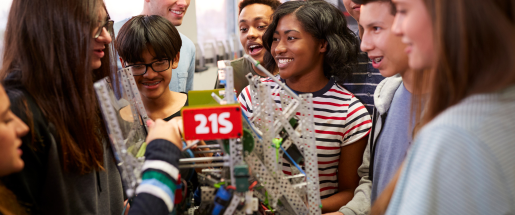Educational exchanges with Erasmus+
What is Erasmus+?
Erasmus+ is the European Union programme supporting actions in education, training, youth and sport. It was created in 1987 as a European programme and has since attracted more than 15 million participants. Nevertheless, it was in 2014 when Erasmus+ opened its participation to countries outside the European Union.
Within the framework of education, it offers opportunities to students, teachers and institutions around the world. Through grant and project funding, Erasmus+ has been promoting mobility and cooperation between universities.
The total budget of Erasmus+ for 2021-2027 amounts to 26 billion EUR (more than 30 billion USD), almost doubling compared to the previous programme.
The European Commission (EU executive body), the Education, Audiovisual and Culture Executive Agency (EACEA) and a number of national agencies in programme and partner countries administer the Erasmus+ programme.
Why participate in Erasmus+?
After a period of training abroad, young people are more successful in the labour market and have greater opportunities to improve their career prospects. It has been demonstrated by the Erasmus+ survey.
One of the competences enhanced by Erasmus+ is multilingualism, the cornerstone of the EU with its 24 official languages. However, many universities offer training in English.
Other soft skills include continuous learning, adaptability, intercultural communication, or leadership. Erasmus+ also allows networking.
Opportunities for individuals

International Credit Mobility
The International Credit Mobility (ICM) modality allows students and teaching and non-teaching staff to undertake a period of study or an internship at a higher education institution within the European Union as part of their degree.
If your home university has inter-institutional agreements with European higher education institutions, you can apply to spend part of your study period at the European partner university, your academic activities abroad will be fully recognized, counting towards your degree once you return to Panama.
Participants and duration:
- Students: bachelor's, master's, internships and doctorate; 2 - 12 months
- Staff: academic and administrative; 5 - 60 days
Erasmus+ BWI scholarships cover: individual support, travel and organisational support. Participants are exempt from tuition fees at the destination university.
The call for places is managed by the Panamanian university. Consult the department of international relations, direction of international cooperation or similar, to know the collaboration agreements with European institutions.
See also: Information and Programme Guide.

Erasmus Mundus Joint Masters
Erasmus Mundus is a transnational, integrated and high-level master's degree programme. This is taught by at least 3 higher education institutions, in two or more countries. At the end of the master's degree, you will get a joint degree or several degrees.
Currently, 210 master's degrees are offered and educational institutions from more than 70 countries are involved.
The masters have a duration of 1 or 2 years (60, 90 or 120 ECTS credits), for example studying 6 months in each institution.
It is necessary to have a bachelor's degree, or to be in the last year of bachelor's studies and graduate before the master's degree begins. Each master's degree offer stipulates its specific requirements, including application dates (normally between October and January).
The application is sent directly to the destination university leading the joint master's degree.
The scholarship covers tuition fees, travel and visa expenses, as well as a recurring contribution. Full scholarships are awarded based on the excellence of the application, but it is possible to participate in an Erasmus Mundus master without a scholarship.
See also: Information and Catalogue of master's degrees.
Comparison between opportunities for students
|
Comparison |
International Credit Mobility |
Erasmus Mundus Joint Masters |
|
Eligible participants |
Bachelor's degree (second or third year) |
Graduates or in final year of bachelor's degree |
|
Duration |
2 - 12 months |
1 - 2 years |
|
University of destination |
1 European university with which the university of origin has signed an exchange agreement |
3+ universities in 2+ countries |
|
Candidacy |
Through the university of origin |
Directly to the university of destination |
|
Tuition |
University of origin |
Exempt (regular price up to 9.000€/year) |
|
Diploma obtained |
University of origin through validation of subjects |
Joint or several of the destination universities |
Opportunities for institutions

Capacity Building in Higher Education
Capacity Building in Higher Education (CBHE) projects support the modernisation and reform of higher education institutions and systems around the world.
Any higher education institution and any public or private organisation active in the labour market or in the fields of education, training and youth can participate in this project.
All projects must include different partners, from at least three different countries. The duration is usually 2 or 3 years.
Current priorities include Green Deal; digital transformation; integration of migrants; governance, peace, security and human development.
Applications must be submitted online in accordance with the annual calls of the Education, Audiovisual and Culture Executive Agency (EACEA).
See also: Information and Programme Guide.

Capacity Building in the field of Vocational Education and Training
Skills Development in Vocational Education and Training (CBVET) programmes aim to boost socio-economic development by strengthening the links between vocational training and the labour market, improving the knowledge and skills of teachers, and strengthening the competences of students including linguistics and information and communication technologies.
Projects can last 1, 2 or 3 years. They are transnational and involve at least 4 organizations from at least 3 countries. Any public and private organization active in the field of VET in Latin America and the Caribbean can apply for the call.
Possible topics include: work-based learning (for young people and/or adults), quality assurance, professional development of teachers, entrepreneurship, support for the development of green and digital skills for the twin transitions.
See also: Information and Programme Guide.

Jean Monet Actions
The Jean Monnet Actions (JMA) support higher education institutions inside and outside Europe, to promote teaching and research on topics related to Europe or relations between Panama and the EU, encouraging policy debate and knowledge exchanges.
The actions included include:
- Jean Monnet Modules: Short teaching programmes or courses in the field of European Union studies
- Jean Monnet Chairs: Teaching posts specialising in European Union studies held by university professors
- Jean Monnet Centres of Excellence: Sharing knowledge and skills on European Union topics, in particular to reach students from faculties that do not usually offer international studies.
Around 9,000 teachers at universities and more than 1,000 universities in 100 countries have received financial support under the Jean Monnet Actions umbrella, enabling them to offer new content on European studies as part of their curricula.
See also: Information and Programme Guide.
Panama and the Erasmus+ programme
Panama is included in Region 10 of the Erasmus+ programme. As such, it is eligible for different modalities (see above).
The following Panamanian universities have International Credit Mobility agreements in place: ADEN University, Universidad Autónoma de Chiriquí, Universidad de Panamá, Universidad del Istmo, Universidad Especializada de las Americas, Universidad Marítima Internacional de Panamá, Universidad Santa María La Antigua, Universidad Tecnológica de Panamá. Other institutions are in the process of signing collaboration agreements. Among the host universities, there are the following in Member States of the European Union: Czech Republic, Spain, France, Hungary, Italy, Latvia, Poland, Romania, Slovakia, Sweden; as well as Turkey.
Among the 17 projects of Capacity Development in the field of Higher Education with Panamanian participation we can highlight: Regional Integration, University and Sustainable Development in Central America (IRUDESCA), Technology Transfer Innovation Schemes in Latin America (TETRIS), Strengthening research, innovation and knowledge transfer on Climate Change & Tourism in Higher Education Institutions in Latin America (CLIMAR) or Strengthening Extension in the Social Ecosystem of Universities in Central America (FUESE, first project led by a Panamanian university). You can find out the list of CBHE projects in Panama here.
In addition, the University of Panama is an associate participant of the Erasmus Mundus Science in Environmental Contamination and Toxicology (ECTPLUS) Joint Master's Degree.
In November 2023, Panama hosted the Erasmus+ Regional Week in Latin America and the Caribbean, a unique opportunity to bring together Erasmus+ National Focal Points from the region, as well as a thematic group meeting and networking seminar. The person designated by Panama as Erasmus+ National Focal Points (ENFP) regularly participates in online and in-person meetings on regional and global level, such as the Erasmus+ Regional Week 2024 in Montevideo, Uruguay, or the NEO-CFI-ENFP Meeting 2024 in Brussels, Belgium.
Find testimonials from Panamanian Erasmus+ participants on our YouTube channel.
La experiencia de Lizzie Torres
La experiencia de Yaneris Velásquez
La experiencia de Danna Villarreal
Stay informed
Erasmus+:
Website: https://ec.europa.eu/programmes/erasmus-plus
Facebook: https://www.facebook.com/EUErasmusPlusProgramme
X: https://twitter.com/EUErasmusPlus
App: www.erasmusapp.eu
Portal Study in Europe: useful information and more scholarship opportunities
Website: http://ec.europa.eu/education/study-in-europe
Facebook: https://www.facebook.com/StudyInEurope.Welcome
Instagram: https://www.instagram.com/studyineurope.welcome
Test to find your perfect country: www.test.studyineuropefairs.eu
Erasmus+ contact at the Delegation of the European Union in Panama:
DELEGATION-PANAMA-ERASMUS@eeas.europa.eu
Erasmus+ focal point at the Ministry of Foreign Affairs of Panama:
https://erasmus-networks.ec.europa.eu/enfp/group/editorial/topic/list-erasmus-national-focal-points
Erasmus Mundus Association - Panama:
Instagram: https://www.instagram.com/erasmusmundus_panama
LinkedIn: https://www.linkedin.com/in/erasmus-mundus-panam%C3%A1-250827335/
Website: https://www.em-a.eu/about
EU Alumni: online community of former participants of EU-funded programmes and initiatives
Erasmus Student Network (ESN): student association which also offers support materials
Erasmus+ and Marie Skłodowska-Curie Actions – Webinar for organisations, students and researchers in Latin America and the Caribbean:




